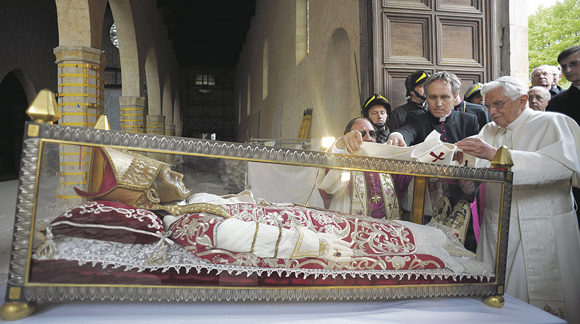by Francis X. Rocca

VATICAN CITY (CNS) – As much as he astonished the world when he announced his resignation Feb. 11, Pope Benedict XVI’s decision seems almost predictable in hindsight. Given his previous statements on the subject and his recent signs of aging, one might say that people should have seen it coming.
The real mystery now is not why Pope Benedict chose to step down; it is how this almost-unprecedented action will affect the papacy and the Church.
In 2010, Pope Benedict told the German journalist Peter Seewald that “if a pope clearly realizes that he is no longer physically, psychologically, and spiritually capable of handling the duties of office, then he has a right and, under some circumstances, also an obligation to resign.”
The signs of fatigue and difficulty walking that have struck most papal observers in recent months led him to conclude, as he told an assembly of cardinals two days before Ash Wednesday, that “strength of mind and body … has deteriorated in me to the extent that I have had to recognize my incapacity to adequately fulfill the ministry entrusted to me.”
Many people today associate unexpected resignations with scandal or crisis. In the immediate aftermath of Pope Benedict’s announcement, there was predictable speculation that he might be stepping down under pressure of some grave problem in the Church, perhaps one yet to be revealed.
But if Pope Benedict declined to resign at the height of the controversy over clerical sex abuse in late winter and early spring of 2010, when some accused him of personally mishandling cases of pedophile priests in Germany and the U.S., it is hard to imagine what sort of crisis he might deem disturbing enough to resign over now.
As he told Seewald later that same year: “When the danger is great one must not run away. For that reason, now is certainly not the time to resign. Precisely at a time like this one must stand fast and endure the difficult situation. That is my view. One can resign at a peaceful moment or when one simply cannot go on. But one must not run away from danger and say that someone else should do it.”
Pope Benedict may have judged the eve of Lent a particularly good moment to announce his resignation since, as the Vatican spokesman, Jesuit Father Federico Lombardi, told reporters at a briefing shortly afterward, the timing practically ensures that the Church will have a new pope by Easter.
It is probably no coincidence, and certainly fitting, that Pope Benedict waited to resign until after he had observed the 50th anniversary of the opening of Second Vatican Council, last October. If his papacy has had a single unifying project, it has been his effort to correct interpretations of Vatican II as a radical break with the past, in favor of readings that stress the continuity of the council’s teachings with the Church’s millennial traditions.
